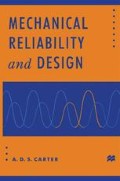Abstract
In statistical design, the failure-inducing stress arising from the load is not assumed to be unique (deterministic) but is allowed to vary according to some distribution, which must of course be known before the design can proceed. It is the distribution that is used in the calculations. Hence we denote the stress due to the load by a probability density function, L(s). In the same way, the resisting strength is taken to be distributed and represented by the probability density function S(s). It, too, must be known before the design can proceed. It is an essential feature of stress-rupture modes, as contrasted with wear modes, that this function remains invariant with time or number of load applications, except for modifications resulting from failures, which have to be deleted from the distribution as they occur. Naturally, the mean strength will be greater than the mean load, and so the two distributions can be plotted on the same graph in the positions shown in Figure 4.1. It should be recalled that the words ‘load’ and ‘strength’ are being used in their widest possible meanings, as discussed earlier.
Preview
Unable to display preview. Download preview PDF.
References
Carter, A.D.S. (1986) Mechanical Reliability, 2nd edn, Macmillan, Basingstoke.
Author information
Authors and Affiliations
Copyright information
© 1997 A.D.S. Carter
About this chapter
Cite this chapter
Carter, A.D.S. (1997). Statistical design: stress-rupture modes. In: Mechanical Reliability and Design. Palgrave, London. https://doi.org/10.1007/978-1-349-14487-7_4
Download citation
DOI: https://doi.org/10.1007/978-1-349-14487-7_4
Publisher Name: Palgrave, London
Print ISBN: 978-1-349-14489-1
Online ISBN: 978-1-349-14487-7
eBook Packages: EngineeringEngineering (R0)

